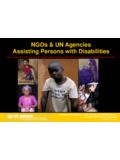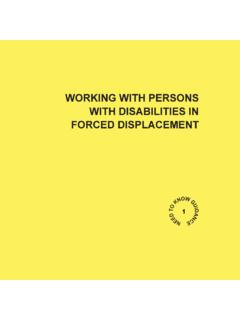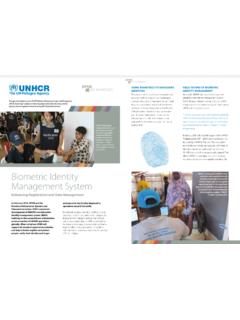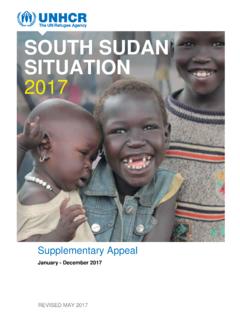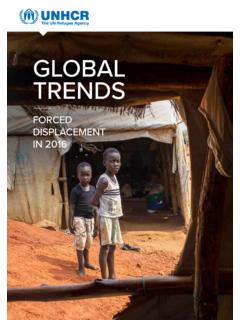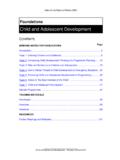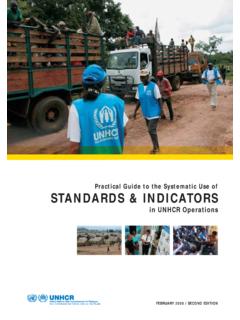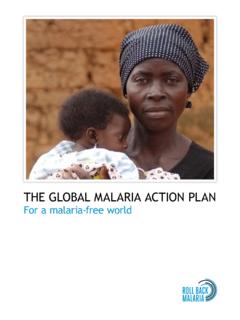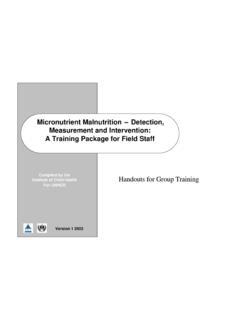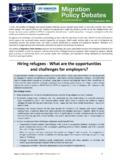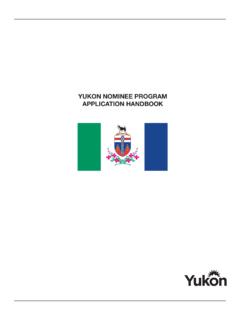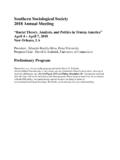Transcription of Kenya project proposals - UNHCR
1 UNITED NATIONS HIGH COMMISIONER FOR refugees STRENGTHENING PROTECTION CAPACITY project Co-Funded by the European Commission and the Governments of Denmark, the Netherlands and the UK project proposals Strengthening Refugee Protection, Assistance and Support to Host Communities in Kenya And Comprehensive Plan of Action for Somali refugees UNHCR Branch Office Nairobi, Kenya August, 2005 The views expressed in this report are those of its author and can in no way be taken to reflect the official opinion of the European Commission, Denmark, Germany, the Netherlands, or the United Kingdom Table of Contents project proposals at a 3 Detailed project proposals .. 8 Income Generation Activities Skills Training in preparation for repatriation for vulnerable 8 Comprehensive medical care for SGBV survivors in Kakuma and liaising with 11 Strengthen RSD 14 Refugee Identification Card.
2 16 Support and training of Community Paralegals in addressing the legal assistance needs of refugees and asylum seekers in Nairobi .. 18 Complementary Food Assistance for refugees in 20 Water for livestock use in Dadaab 22 Increasing access to tertiary Technical and Vocational Education .. 24 Support to skills development and income-generating activities in Dadaab 27 Improved capacity of health services in Kakuma .. 29 IGA Skills training providers 31 Support to skills development and income-generating activities in camp33 Youth Social Entertainment and educational centre .. 35 Capacity Building in 37 Vocational Guidance and Vocational Counseling for youths from minority 39 Training for documentalists and 42 Vocational Training in the Health 44 Building Veterinary Assistance capacities in the refugee 46 Making a community newspaper.
3 48 A Community Radio 50 Enhancing Internet Access .. 52 Building skills in cooking and 54 Skills Development for school drop-outs and long-term unemployed 56 Enterprise-based 58 Building housekeeping skills ..60 Capacity Building in housekeeping .. 62 Capacity Building in 64 Vocational Rehabilitation and Community-Based Rehabilitation (CBR) . 66 Vocational Guidance and Vocational Counseling for refugee youth in Dadaab-camps .. 68 Training and capacity building for refugee governance in 71 Technical Support SPCP/CPA Projects .. 74 project proposals at a glance Income Generation Activities and Skills training in preparation for repatriation for vulnerable groups. (Implementation date: 2005) A project designed to empower refugees and host communities with skills training in Income Generation Activities to enable them to become self sufficient both in the camp and upon return to their home country.
4 Comprehensive medical care for SGBV survivors in Kakuma liaising with Dadaab. (Implementation date: 2005 - 2006) SGBV remains a problem; therefore, a comprehensive and well rounded approach to protecting those violated not only will help the victim but also will educate the community as a whole. A project to provide better protection to survivors of SGBV through an improved programmatic response to SGBV. Training, education of health care professionals and also of the general population, in addition to improving the physical space and forensics is foreseen. Strengthen RSD Capacity. (Implementation date: 2005 2006) The Government of Kenya s intention to take responsibility for refugee status determination has not yet come to fruition, with few signs that it will anytime soon.
5 Consequently, the responsibility remains with UNHCR ; yet at the same time UNHCR does not have the capacity to adjudicate asylum seeker claims within a reasonable period of time. While asylum seekers wait, their ability to access protection and assistance services is severely limited. The project will increase the capacity of UNHCR to make decisions faster, and thereby, able to protect and assist the refugee community in a more satisfactory manner. Refugee Identification Card. (Implementation date: 2005 - 2006) Most refugees in Kenya do not have a secure identification card, which confirms their status in Kenya . The lack of a secure identification card results an inability for refugees to prove their status, and therefore, their entitlement to remain in Kenya .
6 This project will provide a document that will give security and safety to refugees . Support and training of Community Paralegals in addressing the legal assistance needs of refugees and asylum seekers in Nairobi. (Implementation date: 2006) refugees living in urban areas in low income areas and have limited access to legal services, and those services that they do attempt to access often are not familiar with refugee and human rights issues. UNHCR and NGOs provide such services but realistically the majority of refugees and asylum seekers do not have access to them. The project will access existing legal networks willing to serve the refugee community but require capacity building. Complementary Food Assistance. (Implementation date: 2006 - 2007) In both camps, the malnutrition rates due to nutritional deficiencies is unacceptably high causing a general degradation in health standards, which in turn decreases the capacity of refugee communities to improve their overall standard of living.
7 The project will provide additional nutritional supplements to raise the general health and welfare standard in the camps, which in turn will assist in the overall viability of the refugee community to concentrate on income generation projects for both their immediate needs in the camps and future needs upon return. Water for livestock use in Dadaab camps. (Implementation date: 2006 - 2007) The project is designed to separate human and livestock use of water. Currently water destined for human use is diverted to livestock use creating a water deficiency for refugee communities and creating unsanitary conditions around the boreholes. Further, tensions exist with the host community when scarce water supplies are directed to livestock. As a result, the project will increase access to water for human consumption, and thereby, decrease tensions with the local communities.
8 At the same time, because the project is not designed as a donation but rather as an income generation project , the skills learnt will be of assistance well beyond the camp boundaries. Increasing access to tertiary Technical and Vocational Education. (Implementation date: 2006 - 2007) While many students graduate from Secondary School in the camps, comparatively few students are able to further their education. The project will support and permit a selected number of Secondary School graduates to continue with their studies at the vocational level. Students will be selected based on their academic qualifications and that the field of study is one, which will enhance their capacity to repatriate and reintegrate. Support to skills development and income-generating activities in Dadaab camps.
9 (Implementation date: 2006 - 2007) There are a multitude of programmes operating in Dadaab all designed to improve and enhance skills development, income generation and micro-financing. However, there is an insufficient degree of strategic thinking and integration between the numerous programmes resulting in skills and business development not being utilized to its fullest potential. The project , through the hiring of a specialist, will address this weakness in service delivery and enhance the ability for refugees to be self sufficient, and globally address the needs of refugees to acquire the right mix of skills to successfully reintegrate upon return. Improved Capacity of health services in Kakuma A project designed and aimed to introduce a formal and structured teacher training component, as no formal training exists to teach professionals.
10 This is particularly so in the health services area. Provisions for formally recognized training will increase the chances of those trained to find work or to complete for employment once repatriated. Income Generation Activities and Skills providers training A precursor to this project already has been approved under the SPCP implementation scheme for 2005. This project will build upon the existing project in a more extensive and comprehensive manner. The current project is designed to empower refugees and host communities with skills training in Income Generation Activities to enable them to become self sufficient either in the camp or surrounding area, or upon return to their home country. Support to skills development and income-generating activities in the Camp There are a multitude of programmes operating in Kakuma all designed to improve and enhance skills development, income generation, and micro-financing.

